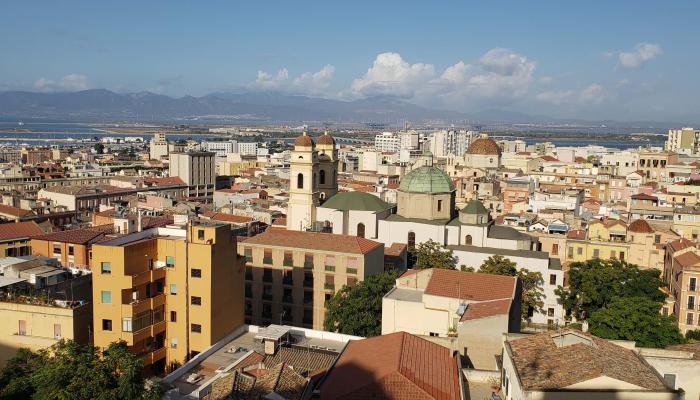Duke Pratt in Italy
A 4-WEEK SUMMER ENGINEERING PROGRAM
THE ITALIAN LANDSCAPE THROUGH THE LENS OF WATER
Apply NowOne of the greatest challenges facing society today is the availability of fresh water. Participants will journey along the Italian peninsula and observe the uneven distribution of water and its hazards: desertification (in the south), sea lever rise (in the north-east), glacial melt (in the north), and the effects of precipitation variability on landslides, food and energy production. Despite these challenges, water also creates opportunities for revising older renewable energy sources like hydropower generation and the so-called water batteries. In the face of climate change, these historic assertions and their successes are receiving significant reassessment and scrutiny today.
PROGRAM FAST FACTS
Location: Milan, Cagliari, Venice, Longarone and Torino, Italy.
Term: Summer I
Dates: May 27- June 28, 2025
Application Deadline: February 1, Rolling admission
Academic Theme(s): Civil and Environmental Engineering, Environmental Studies
Credit Type: Duke Credit
Eligibility: Open to all majors. Freshmen level calculus and physics are required. Non-Duke students are welcome to apply.
Duke Affiliation: Duke Civil and Environmental Engineering
Housing: Hotels, double rooms (singles are not available in most locations)
Independent Travel Time During Program: Personal time is limited; students can travel locally within certain areas during free time, but will not have time to travel internationally.
Primary Contact: Alessandra Trompeo
ACADEMICS
All students will enroll in the signature course offering one Duke credit. No pass/fail option or auditing is permitted.
Engineering Course
Course #TBD
The Italian Landscape Through the Lens of Water
This course will cover the following topics:
- Introduce basic concepts of water resources with emphasis on hydrologic processes such as precipitation, evaporation, transpiration, and soil water flow and their interplay using desertification as a case study.
- Introduce basic concepts in hydraulics with emphasis on mass and momentum conservation laws for fluids and their application to reservoirs, flood routing, and hydraulic structures.
- Introduce basic concepts in soil mechanics as relevant to evaluating land slide hazards, including hazards arising in reservoirs and subsidence.
- Review fundamentals of hydro-climatology to place weather patterns and climatic conditions in the context of the field trips (wind circulation, precipitation patterns and local and regional morpho-climatic conditions, glacial melt).
- Introduce basic concepts in plant-water relations (eco-hydrology) and food web models as impacted by climatic and water variations.
These notions and concepts will be offered through classroom contact time (usually at a partnering university in Italy or a research center) and during field trips to Regional Parks and research sites.
Instructors: Professor Gabriel Katul and Professor Manolis Veveakis
Prerequisite: Freshmen level calculus and physics required.
Activites & Excursions
Activities on this program include:
- Visit to a research site that monitors the effects of droughts on ecosystem functions in Sardinia.
- Visit to the MOSE (Modulo Sperimentale Elettromeccanico) in Venice and navigation of the Venetian Lagune.
- Visit to the Vajont Dam, one of the deadliest human-induced disasters that has redefined the safety procedures for water management operations around the world.
- Visit to the Research Center on Climate Change Impacts - Water and Geological Risk Engineering Program in Rovigo.
- Visit to an agriphotovoltaic farm.
- Visit hydraulic research labs conducting cutting-edge research on water and climate change adaptation.
- Visit to a wine farm on subsiding land.
Students will also visit dams and hydropower plants. Along the coast of Sardinia, students will visit a salt company that is still productive and one that has been devoted to bird (flamingos) sanctuary. Depending on weather, students may have the possibility to visit a high-altitude institute in the Alps where glaciologists conduct research on glacial melt. The program includes guided tours of each city visited and, when possible, visits to historical sites with a hydrological interest.
HOUSING & MEALS
The program primarily uses hotels except in Venice where students will live at Venice International University (VIU) on San Servolo Island. Rooms are double occupancy, singles are not available in most locations. All participants should be prepared to share a room.
Some meals will be covered as part of the program, but the majority of meals will be paid out of pocket by each individual participant.
DATES
Attendance is required at all classes, excursions, and group events. Given the intense nature of this program, late arrival and/or early departure is not permitted.
- U.S. Departure: May 27, 2025
- Italy Arrival: May 28, 2025
- Departure: June 28, 2025
COSTS
These costs are estimated based on previous years’ programs and the current exchange rate. All costs are subject to change.
Summer 2025
| Duke Students | Non-Duke Students | |
|---|---|---|
| Tuition | $2,970 | $2,970 |
| Program Fee | $5,500 | $5,500 |
| Transcript Fee | N/A | $120 |
| Other Costs | Other Costs | Other Costs |
| TOTAL (Estimated): | $13,270 | $13,390 |
Explanation of Costs
The program fee for this program includes:
- Accommodations
- Some meals
- Local transportation
- International SOS Coverage
- Program-sponsored activities and excursions
- Orientation program
What is not included?
Use the following list to assist with budgeting for expenses outside the program fee. This list contains common examples but should not be considered exhaustive.
- Airfare
- On-site accident and health insurance policy
- Out-of-pocket medical expenses
- Immunizations
- Extracurricular activities
- Visa and/or residency permit
- Passport
- Textbooks and class materials
- Cell phone (required)
- Laundry
- Independent travel and entertainment
- Items of a personal nature
- Incidentals
Personal expenses depend entirely on how many extracurricular activities you will spend money on during your free time and days in Italy. It is wise to budget for unexpected expenses such as medical emergencies. You can use a cost-of-living comparison tool to get an idea of what daily life costs in the program host location.
Consult the Duke Bursar's office billing schedule for payment due dates.
Financial Aid
Duke students receiving institutional need-based grant aid are eligible for aid for this program; work-study funds are converted to grants. Students are individually responsible for making the necessary arrangements with the Karsh Office of Undergraduate Financial Support and the Duke Bursar’s Office.
Non-Duke students are not eligible to receive financial aid at Duke and should contact their home institutions for financial aid information.
Scholarships
Review summer study away scholarship opportunities for Duke students on our Scholarships webpage.
VISA & PASSPORT
VISA
U.S. citizens do not need a visa for this program. However, if you are not a U.S. citizen, you may need a visa. Please be sure to research the cost of obtaining a visa, including any required travel to a consulate or embassy.
Starting in 2025, all participants will need to obtain a special travel authorization. More details will be provided to you upon acceptance.
If you receive financial aid, and need assistance with travel costs for your visa, please contact your financial aid counselor.
PASSPORT
All participants must have a valid passport. Make sure your passport has at least six months of validity beyond the program end date to avoid unintended disruptions. For instructions on obtaining or renewing your U.S. passport, visit passports.state.gov.
Program Faculty & Staff
The program faculty director can assist with questions related to program academics, admissions, on-site needs, etc. For all other inquiries, please contact the GEO representative listed.




ADMISSIONS
Deadline: February 1st
This program has rolling admission. Applications will be considered after the deadline of February 1; after that time, students will be notified of their status. Applications must be received by the deadline to be considered. Application opens November 1.
Minimum GPA: There is no minimum GPA.
Non-Duke students: Non-Duke students are welcome to apply for this program. You must be a degree-seeking student in good standing at an accredited college or university. Consult your university’s registrar and/or study away advisor for assistance with transfer credit. Students who are not matriculated at a college or university are not eligible to participate in Duke’s study away programs.
All applicants will be considered without regard to race, color, national or ethnic origin, handicap, sexual orientation or preference, gender, or age.
Before applying to this program, you should assess and determine if you are physically or emotionally able to participate in the following physical demands required by some of this program’s activities:
- Walking or hiking up to 5 miles in a day, sometimes for two or more days in a row, sometimes on hilly, uneven, or cobbled terrain
- Climbing and descending stairs
- Using public transportation, including sometimes crowded buses or trains
- Standing during tours and site visits
- Entering into older buildings with narrow and sometimes steep staircases, at times with limited or no access to elevators
- The possibility of warm/hot temperatures while residing in locations without air conditioning
If you have questions or are concerned about these or any other program activities, please contact the Duke Office of Global Health and Safety (oghs@duke.edu).
APPLY
Start your application early to ensure that it is complete by the deadline! Incomplete applications will not be forwarded to the program directors for consideration.
Submit the following items using MyGlobalEd:
- Online application
- Transcript(s) from all colleges and universities attended. First-year students should wait for fall semester grades to be posted before submitting their transcript.
- Personal statement, no longer than one page, explaining why you would like to participate
- Home university approval form (non-Duke students)
- Passport copy




